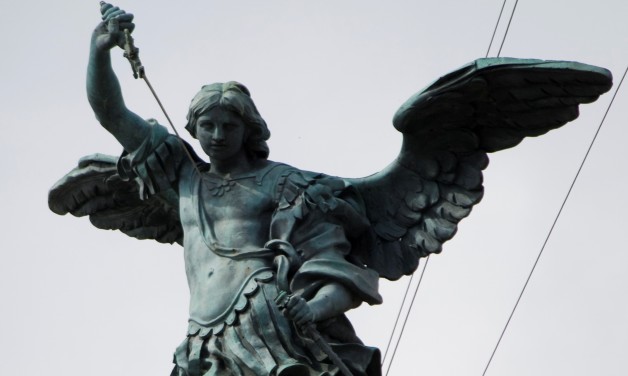St. Michael is an imposing figure. His image throughout history commands strength, power, prestige, and victory. For centuries Christians have turned to his intercession as a direct line – a 9-1-1 call if you will – in their struggles with sin. His angelic person imposes an immediate threat to temptation and all its nastiness. It’s no wonder he’s popular.
But perhaps a more important aspect of St. Michael’s lineage is the question he asks us; it’s enclosed within his very name. Translated from the Hebrew, Michael means “Who is like God?” or “Who can compare with God?” Therefore, every time we utter the name of this Archangel, we ask ourselves, or we ask others, “Who do you stand for?”
In praying to St. Michael we don’t often think in this way. It would be much easier for us in moments of temptation if we could call upon St. Michael and have him immediately fix our issues and problems. It would keep us perfectly safe; we would just rattle off a few prayers to this robust intercessor and sweep the dust under the rug. The angels in heaven would rejoice to see how quickly we become saints! The problem, however, is that this attitude – this false piety – doesn’t actually engage reality. It ignores our real maladies as we hide behind a kind of facade of religiosity. Within this mindset we would actually be dishonest with ourselves and false to what St. Michael wants to do for us.
In the Christian life God gives us many opportunities, which are a sign of His great mercy for us. Our way back to the Father, through our Savior Jesus Christ, is usually a long one, involving many deliberate good decisions along the way. These good decisions begin with the impetus of God’s grace, but they remain truly our free decisions nonetheless.
This is exactly what St. Michael does for us today. At every choice between virtue and vice, between the true good and evil, Michael’s name ought to ring in our spiritual ears. In other words, how does this decision, in this moment, accord with my Christian vocation for holiness? At every moment St. Michael is there reminding us that no matter what may seem “good” now, it fails in comparison to the love God has in store for His faithful ones. Think of St. Paul’s use of Isaiah 64:3: “What eye has not seen, and ear has not heard, and what has not entered the human heart… God has prepared for those who love him” (1 Cor. 2:9). We love God not by mere sentimentality, but through our conscious deliberate choices. “Whoever says ‘I know him,’ but does not keep his commandments is a liar,” says St. John (1 Jn. 2:4).
Yes, St. Michael asks us a question, and his special intercession helps to remind us of that question in moments of trial. Remember, it is St. Michael, strengthened by God, who casts out Satan, our “accuser” (Rev. 12: 7-12). Satan seeks to accuse us before God, to accuse us of failing to make good decisions. The grace of St. Michael is not only a reminder of God’s greatness, but also a reminder of Satan’s defeat. In the end, it is always God who wins.
Rather than use St. Michael as a crutch of piety – hiding behind outward religious practice – we can seek his intercession as the one who challenges us to live for God in every moment. That’s what true piety will get for us, and that’s what engages reality. St. Michael asks a question, which calls upon us to make a choice: Who do you stand for?
✠
Image: Fr. Lawrence Lew, O.P., St. Michael (Castel Sant’Angelo, Rome) (used with permission)







